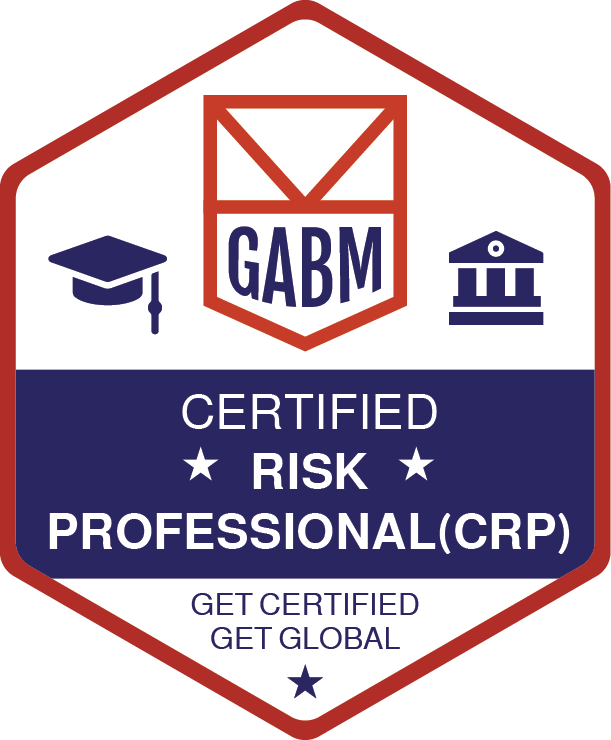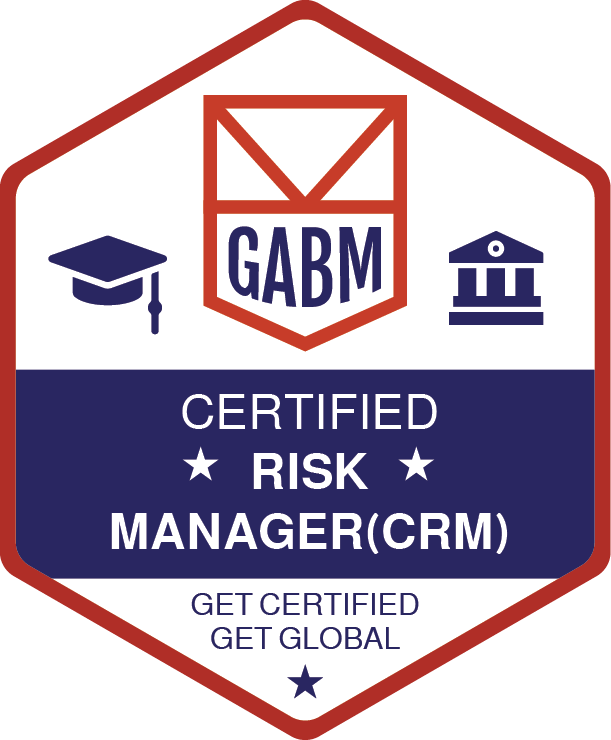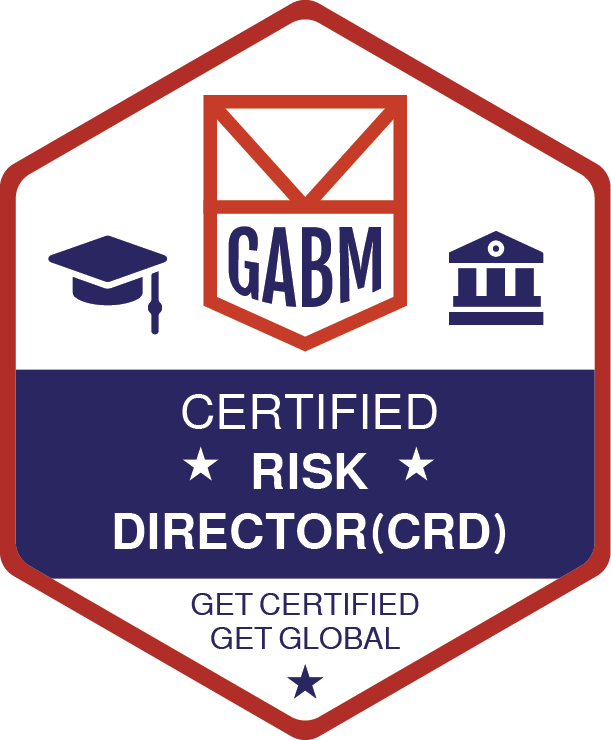The risk management programme is designed for individuals who want to build and understanding of risk analysis to respond to organizational challenges.
It is designed to accommodate graduates and industry practitioners looking to develop or enhance their potential career options in the diverse field of risk management, in industries such as management consulting, health, engineering, aviation, mining, petroleum, finance and more.

It aims to develop graduates skillful in identifying analyzing and managing contemporary risks in an organizational context to enact positive change and ensure sustainable business resilience. It gives you the opportunity to develop knowledge, skills and competencies – the approach that organizations use to manage risk arising from their environment. This will further be applied in real-world and simulated case examples where you can apply various risk management tools and techniques, cumulating in a final consultancy project.
Program Aims
This programme aim to provide students with the skills and expertise to enable them to completely and confidently undertake risk management using an integrated approach. This will enable participants to better understand the process of decision making and the factors which influence it, and hence to critically assess existing processes and/or make more-informed and better risk management decisions.
At the end of the core programme the students will have acquired the following.
- An overview of the concepts and multidisciplinary nature of risk assessment, risk management and governance from a wide variety of standpoints.
- Ability to evaluate the tools used for risk assessment and management in a range of disciplines.
- Critically insights into risk management through the appraisal of a number of risk case studies from different disciplines.
- A level of conceptual understanding that will allow them to critically evaluate prioritization needs.
- Proficiency in understanding the risk management approach, techniques and terminology from other disciplines in order to facilitate proper discussion and integration of strategies.
Building on the above, students will add experience focused directly on their area of interest, experience or employment. Then will have the following.
- Ability to make informed risk management decisions for their area, employing any techniques necessary to acquire and interpret relevant data.
- Ability to communicate effectively with stakeholders (specialists and non-specialists) involved with all aspects of risk management.
- Proficiency in designing risk management strategies for organizations, including regulatory agencies, local authorities and government departments, based on practical exercises undertaken as coursework.
- Those students that complete the programme will have undertaken a major piece of risk management design, evaluation or application within a real world situation.
Graduate Qualifications
- Graduate Certificate in Risk Management
- Graduate Diploma in Risk Management
Designation Qualifications
- Certified Risk Professional (CRP)
- Certified Risk Manager (CRM)
- Certified Risk Director (CRD)





Awards are conferred in accordance with the GABM General and Academic Regulations for Students and the GABM Postgraduate Programme Assessment, Progression and Award Regulations.
Graduate Certificate in
Risk Management
Indian Rupees
Indian Nationals
14,999/-
US Dollars
International
Students
250$
Complete Learning Pack
4-6 Months Access
Graduate Diploma in
Risk Management
Indian Rupees
Indian Nationals
18,999/-
US Dollars
International
Students
300$
Complete Learning Pack
4-6 Months Access
Certified Professional in
Risk Management
Indian Rupees
Indian Nationals
18,999/-
US Dollars
International
Students
300$
Complete Learning Pack
4-6 Months Access
Certified Manager in
Risk Management
Indian Rupees
Indian Nationals
24,999/-
US Dollars
International
Students
350$
Complete Learning Pack
4-6 Months Access
Certified Director in
Risk Management
Indian Rupees
Indian Nationals
29,999/-
US Dollars
International
Students
400$
Complete Learning Pack
4-6 Months Access
Entry Requirements
Entrants to this programme are normally required to have attained the following.
- Applicants should either have at least Secondary school or entry to bachelor degree for
Graduate certificate - Students who have completed bachelor degree / fresher or final year students can apply for
Graduate diploma. - Students who have completed bachelor degree / fresher or final year students can apply for
professional certificate. - Bachelor degree with 2 years’ experience for Managerial certificate.
- Bachelor degree with 2 years’ experience for Managerial certificate.
- Bachelor degree with 5 years’ experience for Director Certificate.
- A good honors degree or equivalent in a relevant subject or and work experience in relevant
management or other related field.
Career Prospect
As a graduate, you’ll benefit from GABM Global academy of business and management excellent reputation in the business community when you are ready to look for employment.Our Risk management programme will equip with important management expertise and core risk management knowledge in order to prepare you for such role as ,
- Claims investigator
- Loss prevention field representative
- Risk manager / Analyst
- Sales agent / Broker
- Underwriter (risk selection)
- Marketing representative
- Customer service representative
- Information technology
- Product development
- Finance / accounting
- Management executive
Who Should Attend
This training course is ideal for individuals, managers and business owners looking to develop their business but with the aim of minimizing any potential hazards along the way.
Learning and Training Methods
The Risk management programme uses a number of different assessment techniques that will allow you to demonstrate your understanding of concepts and issues covered. These may be broadly categorized as ‘coursework’ which may be in the form of individual or group assignments, practical problem-solving exercises and presentations.
It should be emphasized that the purpose of assessment is not only grade you, and provide information to facilitate management of the course, but also to provide feedback to you. In this manage it accordingly. You should keep all the returned assessment work in a file as you may have to submit this at the end of the programme for the academy to assess.
Individual model leaders will distribute information on the methods of assessment used, and their weighing at the start of each module.
Programme Curriculam MAP
|
Module / Description |
Graduate Certificate |
Graduate Diploma |
Certified Risk Professional |
Certified Risk Manager |
Certified Risk Director |
|---|---|---|---|---|---|
| Fundamentals of risk management | |||||
| Risk management approach | |||||
| Risk Assessment | |||||
| Risk Response | |||||
| Risk Strategy | |||||
| Risk Culture | |||||
| Risk Governance | |||||
| Risk Assurance | |||||
| Risk Communications | |||||
| Enterprise risk management | |||||
| Problems identification of risk management | |||||
| Economics of risk management | |||||
| Assignments | |||||
| Project Report-100 Points | |||||
| Credit Points |
140 |
200 |
300 |
340 |
340 |
Modules
Unit 1: Introduction to risk management
- Definition of risk
- Types of risks
- Risk Description
- Inherent level of risk
- Risk classification systems
- Risk Likelihood of magnitude
Unit 2: Approaches to defining risk
- Level of risk
- Impact of hazard risk
- Attachment of risk
- Risk and reward
- Attitudes of risk
- Risk and triggers
Unit 3: Impact of risk on organizations
- Time scale of risk impact
- Four types of risk
- Embrace opportunity risks
- Manage uncertainty risks
- Mitigate hazard risk
- Minimize compliance risk
Unit 4: Scope of risk management
- Origins of risk management
- Development of risk management
- Specialist areas of risk management
- Simple representation of risk management
- Enterprise risk management
- Levels of risk management sophistication
Unit 5: Principles and aims of risk management
- Principles of risk management
- Importance of risk management
- Risk management activities
- Effective and efficient core processes
- Implementing risk management
- Achieving benefits.
Unit 1: Risk management standards
- Scope of risk management standards
- Risk management process
- Risk management context
- Features of risk management standards
Unit 2: Establishing the context
- Scope of context
- External context
- Internal context
- Risk management context
- Designing a risk register
- Using a risk register
Unit 3: Enterprise risk management
- Enterprise wide approach
- Definitions of enterprise risk management
- ERM in practice
- ERM in business continuity
- ERM in energy and finance
- Successful implementation of ERM
Unit 4: Alternative approaches of risk management
- Changing face of risk management
- Managing emerging risks
- Increasing importance of resilience
- Different approaches of risk management
- Structure of management standards
- Future of risk management
Unit 1: Risk assessment considerations
- Importance of risk management
- Approaches of risk assessment
- Risk assessment techniques
- Nature of risk matrix
- Risk perception
- Attitude to risk
Unit 2: Risk classification systems
- Short, medium and long term risks
- Nature of risk classification systems
- Examples of risk classification systems
- FIRM risk score card
- PESTLE risk classification system
- Compliance, hazard, control and opportunity
Unit 3: Risk analysis and evaluation
- Application of a risk matrix
- Inherent and current level of risk
- Control confidence
- 4Ts of hazard risk response
- Risk significance
- Risk capacity
Unit 4: Loss control of risk
- Risk likelihood
- Risk magnitude
- Hazard risks
- Loss prevention
- Damage limitation
- Cost containment
Unit 5: Defining the upside of risk
- Upside of risk
- Opportunity assessment
- Riskiness index
- Upside in strategy
- Upside in projects
- Upside in operations
- The 4T’S of hazard response
- Tolerate risk
- Treat risk
- Transfer risk
- Terminate risk
- Strategic risk response
Unit 2: Risk control techniques
- Types of controls
- Hazard risk zones
- Preventive control
- Corrective control
- Directive control
- Detective control
Unit 3: Insurance and risk transfer
- Importance of insurance
- History of insurance
- Types of insurance cover
- Evaluation of insurance needs
- Purchase of insurance
- Captive insurance companies
Unit 4:Business continuity
- Business continuity management
- Business continuity standards
- Successful business continuity
- Business impact analysis
- Civil emergencies
Unit 1: Core business process
- Dynamic business models
- Types of business process
- Strategy and tactics
- Effective and efficient operations
- Ensuring compliance
- Reporting performance
Unit 2: Reputation and the business models
- Components of business models
- Risk management and business model
- Reputation and corporate governance
- Corporate social responsibility and risk management
- Supply chain and ethical trading
- Importance of reputation
Unit 3: Risk management context
- Architecture – strategy and protocols
- Risk architecture
- Risk management strategy
- Risk management protocol
- Risk management manual
- Risk management documentation
Unit 4: Risk management responsibilities
- Allocation of responsibilities
- Range of responsibilities
- Statutory responsibility of management
- Role of risk manager
- Risk architecture in practice
- Risk committees
Unit 5: Control and selected risk hazards
- Cost of risk controls
- Learning from controls
- Control of financial risks
- Control of infrastructure risks
- Control of reputational risks
- Control of market place risks
Unit 1: Core business process
- Styles of risk management
- Steps to successful risk management
- Defining risk culture
- Measuring risk culture
- Risk maturity models
Unit 2: Importance of risk appetite
- Nature of risk appetite
- Risk appetite and risk matrix
- Risk and uncertainty
- Risk exposure and risk capacity
- Risk appetite statements
- Risk appetite and life style decisions
Unit 3: Risk training and communication
- Consistent response to risk
- Risk training and risk culture
- Risk information and communication
- Shared risk vocabulary
- Risk management information systems ( RMIS )
Unit 4: Risk practitioner competencies
- Competing frameworks
- Range of skills
- Communication skills
- Relationship skills
- Analytical skills
- Management skills
Unit 1: Corporate Governance Model
- Corporate governance
- OCED principles of corporate governance
- LSE corporate governance framework
- Corporate governance of bank
- Corporate governance of government agency
- Evaluation of board performance
Unit 2: Stakeholders expectations
- Range of stakeholders
- Stakeholder dialogue
- Stakeholder and core processes
- Stakeholders and strategy
- Stakeholders and tactics
- Stakeholders and operations
Unit 3: Operational risk management
- Operational risk
- Definition of operational risk
- Measurement of operational risk
- Difficulties of measurement
- Developments in operational risk
Unit 4: Project risk management
- Introduction to project risk management
- Development of project risk management
- Uncertainty in projects
- Project lifecycle
- Opportunity in projects
- Project risk analysis and management
Unit 5: Supply chain management
- Importance of supply chain
- Scope of supply chain
- Strategic partnership
- Joint ventures
- Outsourcing of operations
- Risks and contracts
Unit 1: The control environment
- Nature of internal control
- Purpose of internal control
- Control environment
- Features of control environment
- Good safety culture
Unit 2: Risk assurance techniques
- Audit committees
- Role of risk management
- Risk assurance
- Risk management outputs
- Control risk self-assessment
- Benefits of risk assurance
- Reporting on risk management
- Risk reporting
- Risk reports by US companies
- Charities risk reporting
- Public sector risk reporting
- Government report in national security
- Introduction to risk communications
- Definitions of risk communications
- Internal risk communication
- External risk communication
- Introduction
- What is Enterprise risk management
- History of ERM
- Trends in ERM
- The financial sector
- The state of ERM
- ERM for dummies
- Risk management standard and guidance
- ISO 31000 : 2018 RM Guidelines
- ISO 31000 : 2018 RM Process
- Across the enterprise
- Three enterprise risk management concepts
- Introduction
- What’s a problem what’s an opportunity
- Framing the problem
- Problems and opportunity identification technique
- Problems and opportunity statement
- Two problem solving traits
- Introduction
- Economics of risk management
- Economics and decision making
- Economics basics for interactions among people
- Principles of economy as a whole
- Economic analysis
Program Structure
| Module Code | Module | Core/Elective | Credit Points |
|---|---|---|---|
| RM-101 | Fundamentals of risk management | Core | 20 |
| RM-102 | Risk management approach | Elective | 20 |
| RM-103 | Risk Assessment | Core | 20 |
| RM-104 | Risk Response | Elective | 20 |
| RM-105 | Risk Strategy | Core | 20 |
| RM-106 | Risk Culture | Elective | 20 |
| RM-107 | Risk Governance | Core | 20 |
| RM-108 | Risk Assurance | Core | 20 |
| RM-109 | Risk Communications | Elective | 20 |
| RM-110 | Enterprise risk management | Elective | 20 |
| RM-111 | Problems identification of risk management | Core | 20 |
| RM-112 | Economics of risk management | Core | 20 |
| Distinctive features of the Programme | |||
|
|||
Assessment Pattern
The GABM global academy consists of variety of assessment modes.
- Assessed assignments ( in essay , report, problem, case studies or short question format)
- Written examination papers.
- Project report submission.
The exact combination of assessment varies from programme to programme and from module to module.
| Programme | Assessment pattern | Credit Points |
|---|---|---|
| Graduate certificate in Risk Management |
1 Assignment | 140 |
| Graduate Diploma in Risk Management |
2 Assignment | 200 |
| Certified Risk Professional(CRP) |
3 Assignment | 300 |
| Certified Risk Manager(CRM) |
3 Assignments with project report | 340 |
| Certified Risk Director(CRD) |
3 Assignments with project report | 340 |
Note: Assignments and patterns are subject to change without notice; candidates are required to contact office of executive education and professional certification of the academy for respective programme before start of the course.

